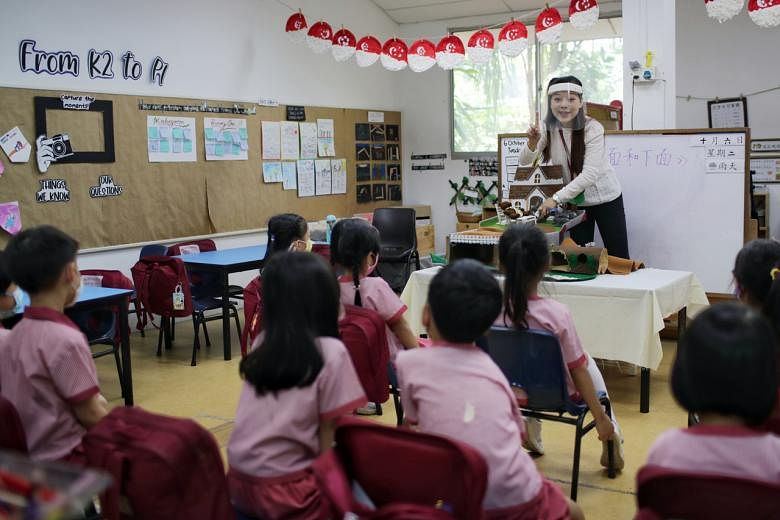SINGAPORE - Pre-schools here have been encouraged to provide ergonomic furniture to improve the posture of their staff, adopt technology to ease their administrative workload, and consider vocal training courses for them to avoid strained voices in open concept classrooms.
These are among new recommendations and initiatives that aim to improve the well-being, job satisfaction and productivity of pre-school educators.
The Early Childhood Development Agency (ECDA), Health Promotion Board and Workplace Safety and Health Council began an occupational health and safety assessment for the sector two years ago.
The recommendations were announced on Wednesday (Sept 1) by Minister for Social and Family Development Masagos Zulkifli during a Teachers' Day virtual visit to NTUC First Campus' My First Skool @ Yung An.
The assessment evaluated the work roles and environments of pre-school staff and identified factors that impact their well-being. Ten centres and more than 280 staff participated in the study, ECDA said in a statement.
One finding was that educators typically have inadequate lumbar support and encounter pressure on their knees from working with child-sized furniture and engaging infants and toddlers on the floor or during outdoor activities. They could also be in awkward postures during routine care such as showering and diapering.
ECDA said most staff had indicated they were happy with their workplace and relationships and their rapport with colleagues and supervisors, though more than half reported that they faced significant stress levels.
The recommendations were in four key areas - enhancing workplace health and safety capabilities; building and designing a more staff-friendly workplace; facilitating the use of technology to improve work processes; and promoting the physical and mental well-being of staff.
Some initiatives were announced to help pre-schools improve in these areas.
For example, the Association of Early Childhood and Training Services has a list of ergonomic furniture, equipment and vendors for the sector at discounted rates.
ECDA will also be providing funding to pre-school operators to encourage them to adopt digital tools. More details will be announced later this year.
The 10 pre-schools in the study have begun implementing solutions and adopting workplace health programmes to improve the well-being of their educators.
For example, My First Skool @ Yung An has adopted technological solutions to help educators with administrative tasks such as attendance-taking and communication with parents.
It also allocates two hours of non-contact time per week for lesson planning and ensures that every centre is equipped with a Teacher Resource Room conducive for staff to rest or prepare for their lessons.
Mr Masagos said: "We recognise the importance of our educators' well-being. Even as they look out for our children's welfare and development, we too want to ensure that their needs at the workplace are being met because we care for them."
He added: "I encourage more pre-schools to adopt the recommendations and to tap on the range of support available."


